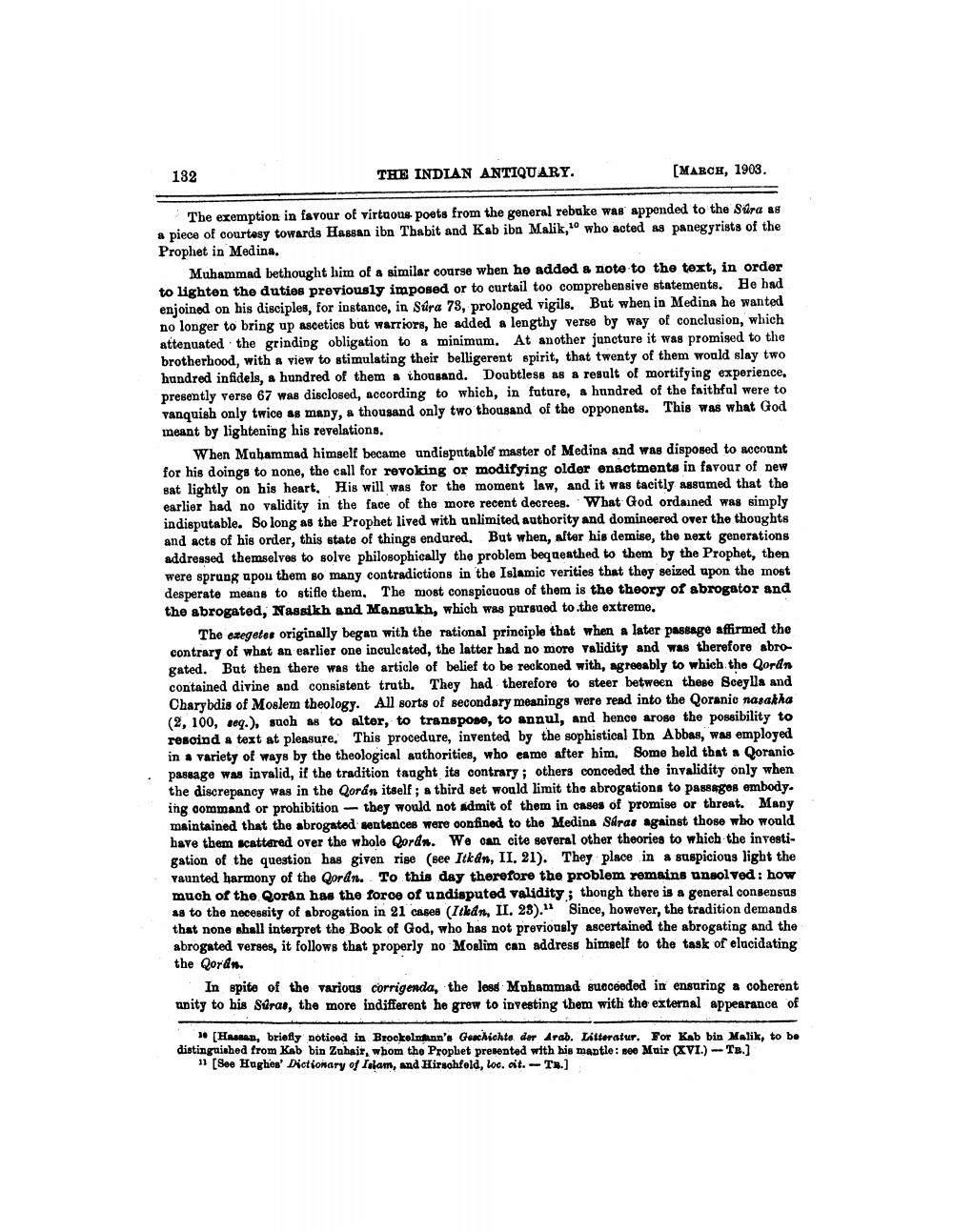________________
132
THE INDIAN ANTIQUARY.
[MARCH, 1903.
The exemption in favour of virtuous poets from the general rebuke was appended to the Súra as a piece of courtesy towards Habsan ibn Thabit and Kab ibn Malik, 2° who acted as panegyrists of the Prophet in Medina.
Muhammad bethought him of a similar course when he added a note to the text, in order to lighten the duties previously imposed or to curtail too comprehensive statements. He had enjoined on his disciples, for instance, in Súra 78, prolonged vigils. But when in Medina he wanted no longer to bring up ascetics but warriors, he added a lengthy verse by way of conclusion, which attenuated the grinding obligation to a minimum. At another juncture it was promised to the brotherhood, with a view to stimulating their belligerent spirit, that twenty of them would slay two hundred infidels, a hundred of them a thousand. Doubtless as a result of mortifying experience, presently verse 67 was disclosed, according to which, in future, a hundred of the faithful were to vanquish only twice as many, a thousand only two thousand of the opponents. This was what God meant by lightening his revelations.
When Muhammad himself became undisputable master of Medina and was disposed to account for his doings to none, the call for revoking or modifying older enactments in favour of new Bat lightly on his heart. His will was for the moment law, and it was tacitly assumed that the earlier had no validity in the face of the more recent decrees. What God ordained was simply indisputable. So long as the Prophet lived with unlimited authority and domineered over the thoughts and acts of his order, this state of things endured. But when, after his demise, the next generations addressed themselves to solve philosophically the problem bequeathed to them by the Prophet, then were sprung upou them so many contradictions in the Islamic verities that they seized upon the most desperate means to stifle them. The most conspicuous of them is the theory of abrogator and the abrogated, Nassikh and Mansukh, which was pursued to the extreme.
The exegeter originally began with the rational principle that when a later passage affirmed the contrary of what an earlier one inculcated, the latter had no more validity and was therefore abro gated. But then there was the article of belief to be reckoned with, agreeably to which the Qorin contained divine and consistent truth. They had therefore to steer between these Sceylla and Charybdis of Moslem theology. All sorts of secondary meanings were read into the Qoranic nasakha (2, 100, seq.), such as to alter, to transpose, to annul, and hence arose the possibility to rescind a text at pleasure. This procedure, invented by the sophistical Ibn Abbas, was employed in a variety of ways by the theological anthorities, who eame after him. Some held that a Qoranio passage was invalid, if the tradition taught its contrary; others conceded the invalidity only when the discrepancy was in the Qorán itself; a third set would limit the abrogations to passages embody. ing command or prohibition they would not admit of them in cases of promise or threat. Many maintained that the abrogated sentences were confined to the Medina Sdras against those who would have them scattered over the whole Qordn. We can cite several other theories to which the investigation of the question has given rige (see Itkán, II. 21). They place in a suspicious light the vaunted harmony of the Qoran. To this day therefore the problem remains unsolved: how much of the Qoran has the force of undisputed validity; thongh there is a general consensus as to the necessity of abrogation in 21 cases (Itkdn, II. 28)." Since, however, the tradition demands that none shall interpret the Book of God, who has not previously ascertained the abrogating and the abrogated verses, it follows that properly no Moslim can address himself to the task of elucidating the Qoran.
In spite of the various corrigenda, the less Muhammad succeeded in ensuring a coherent unity to his Suras, the more indifferent he grew to investing them with the external appearance of
** [Hasan, briefly noticed in Brookolnkin's Geschichte der Arab. Litteratur. For Kab bin Malik, to be distinguished from Kab bin Zuhair, whom the Prophet presented with his mantle: nee Muir (XVI.) -TE.]
11 (See Hughes' Dictionary of Islam, and Hirschfeld, loc. at.-T.]




